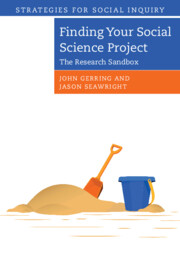Book contents
- Finding Your Social Science Project
- Strategies for Social Inquiry
- Finding Your Social Science Project
- Copyright page
- Contents
- Detailed Contents
- Figures
- Tables
- Acknowledgments
- Glossary
- 1 Introduction
- Part I Overview
- Part II Playing with Ideas
- Part III Playing with Data
- 6 Case Selection
- 7 Soaking and Poking
- Part IV Playing with Theories
- Part V Conclusions
- Appendix A Surveys and Interviews
- References
- Index
6 - Case Selection
from Part III - Playing with Data
Published online by Cambridge University Press: 06 October 2022
- Finding Your Social Science Project
- Strategies for Social Inquiry
- Finding Your Social Science Project
- Copyright page
- Contents
- Detailed Contents
- Figures
- Tables
- Acknowledgments
- Glossary
- 1 Introduction
- Part I Overview
- Part II Playing with Ideas
- Part III Playing with Data
- 6 Case Selection
- 7 Soaking and Poking
- Part IV Playing with Theories
- Part V Conclusions
- Appendix A Surveys and Interviews
- References
- Index
Summary
Chapter 6 introduces a case-based approach to exploratory research. Here, a tight focus on particular case or a small number of cases allows for a detailed but preliminary exploration of phenomena. For this purpose, we lay out techniques of case selection where the analysis is exploratory rather than confirmatory. These techniques may be categorized as (a) extreme, (b) index, (c) deviant, (d) most-similar, or (e) diverse.
- Type
- Chapter
- Information
- Finding your Social Science ProjectThe Research Sandbox, pp. 135 - 149Publisher: Cambridge University PressPrint publication year: 2022

